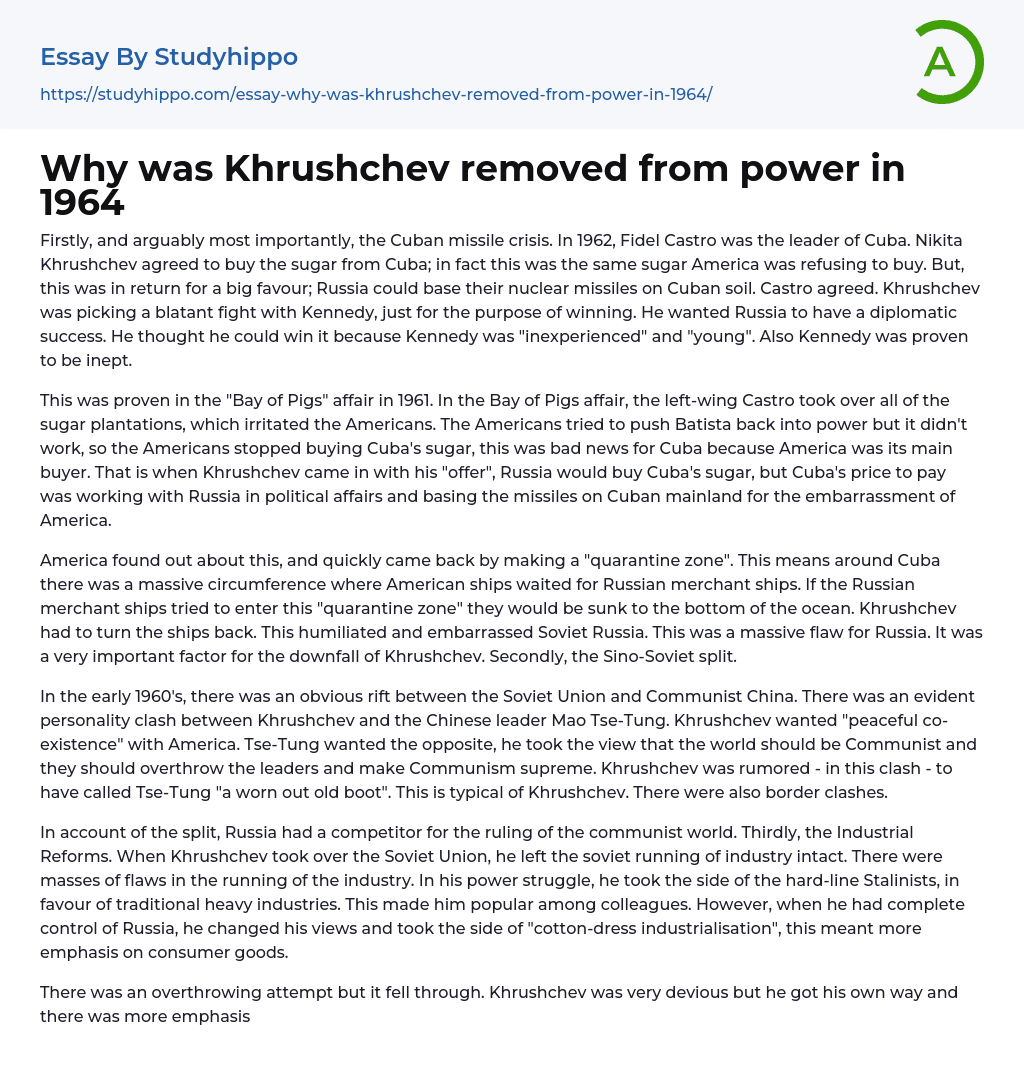

Why was Khrushchev removed from power in 1964 Essay Example
Firstly, and arguably most importantly, the Cuban missile crisis. In 1962, Fidel Castro was the leader of Cuba. Nikita Khrushchev agreed to buy the sugar from Cuba; in fact this was the same sugar America was refusing to buy. But, this was in return for a big favour; Russia could base their nuclear missiles on Cuban soil. Castro agreed. Khrushchev was picking a blatant fight with Kennedy, just for the purpose of winning. He wanted Russia to have a diplomatic success. He thought he could win it because Kennedy was "inexperienced" and "young". Also Kennedy was proven to be inept.
This was proven in the "Bay of Pigs" affair in 1961. In the Bay of Pigs affair, the left-wing Castro took over all of the sugar plantations, which irritated the Americans. The Americans tried to push Batista back into
...power but it didn't work, so the Americans stopped buying Cuba's sugar, this was bad news for Cuba because America was its main buyer. That is when Khrushchev came in with his "offer", Russia would buy Cuba's sugar, but Cuba's price to pay was working with Russia in political affairs and basing the missiles on Cuban mainland for the embarrassment of America.
America found out about this, and quickly came back by making a "quarantine zone". This means around Cuba there was a massive circumference where American ships waited for Russian merchant ships. If the Russian merchant ships tried to enter this "quarantine zone" they would be sunk to the bottom of the ocean. Khrushchev had to turn the ships back. This humiliated and embarrassed Soviet Russia. This was a massive flaw for Russia. It was a ver
important factor for the downfall of Khrushchev. Secondly, the Sino-Soviet split.
In the early 1960's, there was an obvious rift between the Soviet Union and Communist China. There was an evident personality clash between Khrushchev and the Chinese leader Mao Tse-Tung. Khrushchev wanted "peaceful co-existence" with America. Tse-Tung wanted the opposite, he took the view that the world should be Communist and they should overthrow the leaders and make Communism supreme. Khrushchev was rumored - in this clash - to have called Tse-Tung "a worn out old boot". This is typical of Khrushchev. There were also border clashes.
In account of the split, Russia had a competitor for the ruling of the communist world. Thirdly, the Industrial Reforms. When Khrushchev took over the Soviet Union, he left the soviet running of industry intact. There were masses of flaws in the running of the industry. In his power struggle, he took the side of the hard-line Stalinists, in favour of traditional heavy industries. This made him popular among colleagues. However, when he had complete control of Russia, he changed his views and took the side of "cotton-dress industrialisation", this meant more emphasis on consumer goods.
There was an overthrowing attempt but it fell through. Khrushchev was very devious but he got his own way and there was more emphasis on consumer goods in industry. His main reform was in 1958 when he introduced 105 regional economic councils "the sovnarkhozy". Every sovnarkhoz had to manage the affairs of its region. The sovnarkhozy was just something for Khrushchev to use to hide behind the "metal-eaters". The sovnarkhoz was discarded after Khrushchev's downfall. There were low wages in industry, no overtime but
there was no unemployment.
This led to over manning in factories. Fourthly, and again most importantly, the Virgin Lands project. When Khrushchev took over, Russia was finding it hard to feed itself, due to a large population increase. Collectivisation was proving to be inefficient and unproductive. Russia needed an agricultural reform. Khrushchev made gigantic state farms in remote uncultivated parts of Russia namely Siberia and Kazakhstan. He did not choose the Ukraine because it had an extremely unreliable climate and suffered bouts of drought.
There was a low morale of collective workers because they were not making a profit, this equalled low work, and maybe the Virgin Lands project was just the boost they needed to make their lives more interesting. The Virgin Lands project was not the only solution to Russia's agricultural problems, maybe private agriculture would have produced better outputs, but Khrushchev quickly ruled it out because it would be going against communist principles. There were three main differences between state farms and collective farms; I will outline them in a table below.
- Activism essays
- Communism essays
- Conservatism essays
- Liberalism essays
- Marxism essays
- Nationalism essays
- Patriotism essays
- Policy essays
- Public Policy essays
- Social Contract essays
- Socialism essays
- Totalitarianism essays
- Cuba essays
- Haiti essays
- Jamaica essays
- Puerto Rico essays
- Cuban Missile Crisis essays
- Fidel Castro essays
- French Revolution essays
- Han Dynasty essays
- Hiroshima essays
- Imperialism essays
- Jack The Ripper essays
- Mao Zedong essays
- Middle Ages essays
- Mongols essays
- Nelson Mandela essays
- Ottoman Empire essays
- Reformation essays
- Reign of Terror essays
- Renaissance essays
- Roaring Twenties essays
- Romanticism essays
- Samurai essays
- Scientific Revolution essays
- Soviet Union essays
- Actions essays
- Biography essays
- Helping Others essays
- Leader essays
- Mission essays
- Power essays
- Purpose essays
- Superhero essays



